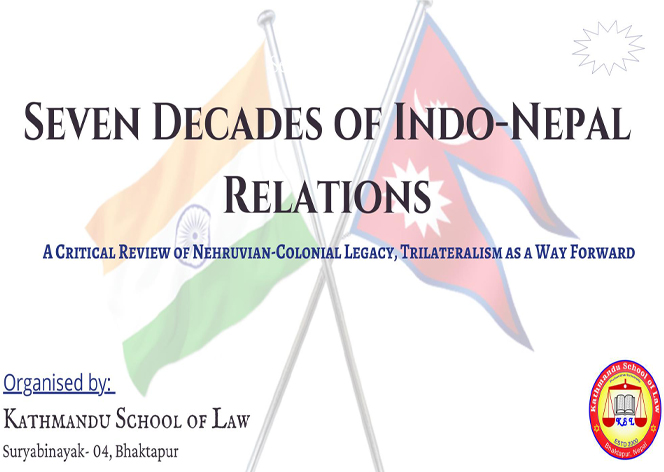Seven Decade of Indo-Nepal Relations: A Critical Review of Nehruvian-Colonial Legacy, Trilateral as a way forward

The program organized by the BALLB 2nd year was help on the hall of KSL, dated 21 July 2022 (05 shrawan 2079 BS) was about the commenting and presenting the article "Seven Decade of Indo-Nepal Relations: A critical Review of Nehruvian-Colinial Legacy, Trilateral as a way forward" written by Prof.Dr. Yubaraj Sangroula which is published in the Vol.1 of Asian Journal of International Affairs, year 2021.The program was moderated by Shishir Dhital, a student of BALLB second year of KSL.
The first speaker was Mr. Nabin Khatri, a student of BALLB third year. He very eloquently talked about the major issues mentioned in the article. He very orderly enlightened the Audience about different events taken place in different years. He asserted the 1950 treaty an unequal treaty which is India centric. He also mentioned about Janakpur treaty. He talked about the history of India not intending to recognize the sovereignty of Nepal. He briefly talked about the nehruvian mindset and ideas. He also founded some factual errors in the article like dates of different events happened in past. At the end of his presentation he said he is skeptic about the title Indo-Nepal relation. He questioned why it's not Nepal-India relation instead of indo-Nepal relation?
The next speaker was Rose Singh, a student of second year of KSL. She rightly highlighted the role of Nepal that it can play, but which it is unable to. She talked about India using her soft power. She claimed India to be treating Nepal as a secondary state. At last she concluded her presentation by saying the Nepal's hyper dependence on India can cost Nepal it's democracy. So Nepal should find ways to deal with it.
The third speaker of the program was Zhang Sheng. He is a visiting assistant professor of International Relation at KSL, permanently resided in China. He talked about the heavily colonized mentality of India asserting few examples to the audience. He mentioned about the historitization He claimed India to be following the British Legacy. He said India to be the successor of Britain, following them. He also mentioned the Colonization in Asia introduced Western ideas. He believes India to be advantageous due to its Geo-political setting. He claimed India to be learning the British policy of divide and rule and applying it for their best interest. He said India to have learnt activities like blockade. The speaker presented his different convincing ideas for his favour.
The next speaker of the program was Sisan Bhandari, a student of BALLB second year. He presented his review of the article written by Professor Sangroula in Nepali language unlike others. He stressed on India not recognizing the sovereignty of Nepal. The speaker talked about the Ranas mindset of following towards the British. He mentioned the British did not colonized Nepal geographically but they did that on Nepalese Population. He also mentioned the Indian media takes China as a security threat. At the end of his presentation he put a question for the author, "Can we see the nehruvian colonial idea without the idea of Gandhi?"
The last and final speaker of the program was Prof.Dr. Yubaraj Sangroula, the author of the article. He is the executive director of Kathmandu School of Law. He talked about Nepal's foreign policy dominated by India, Nehruvian legacy. His raised a question i.e. "Is India free from British regime or they are the successor of of them?". His hypothesis was they are the successor, he backed his hypothesis with 5 different reasons like their laws like India government Act, Indian penal code, evidence act were made by the British. He took the McMahon agreement of Indo-China borders to back his hypothesis. After this he talked briefly about different events specifying their date like 1950 agreement, the act of India keeping army in northern Nepal in 1959, the Non-alignment movement of 1956, Nehru's visit to China in 1956, deposition of the 1923 agreement to league of national which saved Nepal's sovereignty and failed the India's intention to annex Nepal. He also talked about the National government of China declaring Nepal as Duke State, i.e. a regional state. He stressed to 1950 agreement and 1823 sugauli treaty to be different, and only either of them can be valid. He said Nepal was recognized as independent country in 1801 through the border treaty of 1801. He also mentioned Nepal as the first country to speak against colonization. He talked about the tea horse road which existed from 600 to 1100 connecting China and India, which mad Nepal very wealthy then by the exporting wool and sword. Nepal minted the coins of India and China, which also helped Nepal to be rich. He claimed Nepal to be first country to make paper and pen in 652 after China. He also talked how did the British weaken Nepal?' At the very end of his presentation he stressed the policy toward Nepal was not Indian policy but nehruvian policy, which everyone need to know. He concluded by saying the independence of Nepal for India is 'Guided Independence' and the outsiders wanted 'Controlled Instability ' in Nepal.
At the very end of the program, there was a brief question answer session. All those questions were addressed by Professor Sangroula. Hrithik Yadav,a BALLB third year student expressed his dissent with 1950 Treaty of Peace and Frienship concluded in between Indian and Nepal. His contention was that the treaty conflicts with international customary law, treaty law and the values of bilateralism. Responding to his question, Prof. Sangroula insisted on essence of researching and publishing on same issue.
The seminar was highly productive for all the Audience. It was great to learn about different historical development in indo-nepal and chino-nepal relationship. It was a great share of intellectuality.
